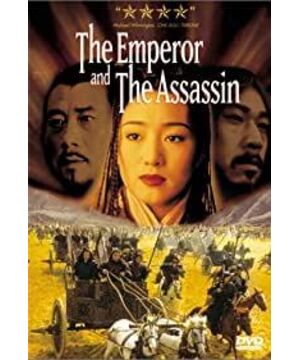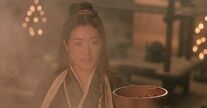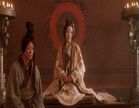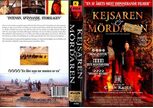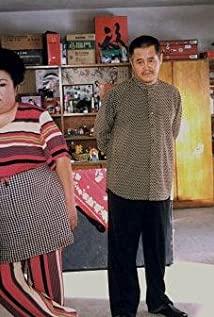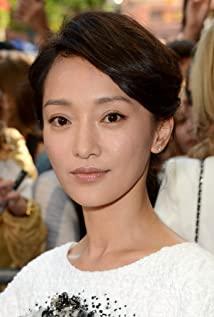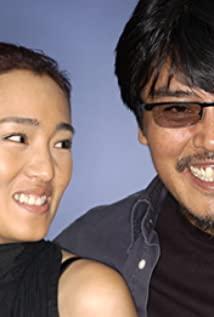After the film was performed, Director Chen answered a number of questions from the new alumni in the so-called meeting forum. Of course, it involves sensitive issues about Jiang Wen, and he avoids talking about it. At his age and status, the questioner was obviously too simple and too boring. More than an hour of panel discussion flew by, many of which were professional questions. Director Chen gave very experienced answers. We put aside these questions and abandon the nagging about tidbits. There are still some questions that are worthy of discussion by the audience. of. I am a little sad to write this topic in a
fixed mindset
. I always think that art needs innovation. In fact, it is said in school textbooks. But we still look at art from the old perspective, not only for the audience, even for the creators. It is also difficult for us to avoid this shadow.
In "Assassination of Qin", the actor of Ying Zheng is Li Xuejian, and Jiao Yulu's image must be his most popular and successful portrayal. Some people think that this people’s public servant’s appearance is not powerful enough to show Qin Shihuang’s martial arts, as if the person who asked the question has indeed seen Ying Zheng. He is two feet tall and his eyes are like bronze bells. Cheese. Director Chen had no choice but to say that the first emperor in the history books was not awe-inspiring, even a bit humble and nasty. In comparison, Li Xuejian could be regarded as a standard beautiful man. Director Chen's words can be described as witty, but there is some helplessness, like a black humor, which is alarming. I really don't understand, why do people who have built great achievements have such an image? Is it a historical record or a folk chant? In fact, for King Qin, he acquired the Baiyue in the south, but the Huns in the north, and he established the first multi-ethnic unified feudal empire in Chinese history. He is indeed a remarkable person. His greatness or beyond ordinary people is His mind and courage have nothing to do with his body appearance. There was such a great man in French history a few centuries ago. We all call him Little Napoleon. We accept this appellation. The great men who want to come to other places are small men, and our heroes must be tall and majestic. Harder? What a pathetic and ridiculous arrogance plus conventional thinking. The root cause may be related to the habit of bowing to the ground by the heads of Guizhou. Of course, there is also a person named Gao Daquan in history who is the master of these fixed thinking. .
A few years ago, the Northeast sketches swept the country, and several representatives emerged, such as Zhao Benshan and Pan Changjiang and his ilk. These two people are indeed deeply rooted in the hearts of the people. If you want to be bored, you might as well listen to them. It is also a good way to pass the time. Director Chen used these two people as guest roles in the film, and people always seem to feel a little incompatible with the style of the film. Director Chen explained that in his mind there is only the concept of actors, not the name of comedians. He also hopes that the audience will not categorize actors. He also cited American Tom. Hanks’ example. Before Forrest Gump, Hanks was a standard American comedy star. People who have seen "the man in a red leather shoe" and "the mermaid" may know this. But when he played the role of Forrest Gump, there was no roar of laughter in American theaters. When watching the film, American audiences only paid attention to the character A-Gump, not Tom. Hanks' background, of course, is another matter off the screen. Director Chen’s words are indeed good words. Regardless of what role Pan and Zhao play in the film, thinking of many types of actors in China, the reason why they did not have the courage to expand their play is really to cater to the audience’s consistency. Impression, showing one's many talents can only be an extravagant hope. If Chinese audiences have always been like this, I think the person who suffers the most in modern times is Xiao Yanzi. To put it further, if Chinese films blindly cater to Chinese audiences with fixed thinking like actors, I would be disappointed in the future of Chinese films. .
In this film, besides King Qin, another important figure is Jing Ke. Undoubtedly, he is a tragic hero. The tragic song "The wind is cool and easy and the water is cold, the hero is gone and never returned" has been passed down through the ages. Many people think that the scene of Yi Shui's parting is not tragic enough to show the determination of the strong man Jing Ke to go to righteousness generously. Perhaps everyone has an understanding in their hearts. Director Chen's understanding is different from that of the public, which is permissible. Although this kind of treatment is the advantage of personal ideas, but from the perspective of the storyline, this kind of treatment is not inappropriate. I don't know if Director Chen took into account the development of the plot when he answered this question, because he just said that his understanding is not so tragic. I think Jing Ke bid farewell to Yan Zidan and Mrs. Zhao on the banks of the Yi River. Although he was determined to die, he also left with the belief in victory. At this time, he is no longer simply doing things for Yanzidan or Madam Zhao. What he thinks in his mind is to kill the people, to kill the cruel tyrant, so that the people of the six countries will not suffer from charity. It is so meaningful, and yet Where is the tragic and majestic act of honorable deeds that go down in history? The tragic in our minds is because the known hero has failed. To be tragic because of this failure is to put the result to the front to experience the development of the plot. In fact, this is unconventional. Appreciating art should first clean the cerebellum before proceeding. Is it possible to deliberately make a tragic scene in order to foreshadow the subsequent failure? The Chinese football team has a swearing ceremony before going to various games. If it is more tragic, wouldn't it be laughable!
These issues are brought up for discussion to show that art needs to be appreciated with new eyes. We have been saying that China cannot produce good films, as if the responsibility lies with the directors. Maybe this is true, because there are indeed many movies that are not movies. But China does have some good movies with innovative colors, but how many viewers patronize theaters? I have no intention of blaming the audience. It's not that the audience has no mistakes. For example, this kind of old vision and stereotyped thinking are no small mistakes. But I also know that the audience is God, and this is not wrong, it's just a little sad.
I remember the late Japanese director Akira Kurosawa once said, "Japanese people are very picky about Japanese films. We Japanese think too little about our own things. Why don't we protect our films? What are we afraid of? ?" Kurosawa's confusion 30 years ago turned out to be our modern confusion, and it hasn't even become a confusion. Isn't it a very sad thing? Indeed, whether it is the audience, the filmmakers, or the censorship department, they should be picky about Chinese films. Unfortunately, they have used a fixed vision to create many frames. Such a move of smashing stones and feet is too funny and makes people. Ridiculed. We can think about the influence of another version of "Assassin" in Japan. I am afraid that the act of piercing our brain with a sharp blade at this time could not be better. The pleasure at that moment must be strong and exciting! The two most famous
film
directors of the fifth generation in China are Zhang Yimou and Chen Kaige. Recently, the duo's new film happened to go in two directions. "None can be less" is a small theme, but it tells a big problem; "Assassin" expounds a small problem in the big theme.
After watching "Assassin", it feels like it was not Japan's investment in China's production, but the United States' investment in Japan's production. We all know, or we all have experience, that the exploration of human nature in Japanese films is very deep, and it is precisely because of this that I have this feeling. No wonder Director Chen said this at the symposium. It is hard to distinguish good from bad if he only learned from the Beijing Film Academy. From the perspective of human nature, we can see a lot of good, and there are some bad things hidden in the good; we can also see a lot of bad, in the bad, there is the good that we want to burst out. This is what art expresses. Hidden bad and want to burst out good.
When a teacher from Beijing Film Academy commented on "Assassin Qin", Chen Kaige had indeed established the theory of human nature he had learned, but lacked the accumulation of character. The teacher’s words are very sharp. We can see the weakness of King Qin, the conceit of Jing Ke, the childishness of Madam Zhao and the affectionate affection of Madam. Without being foreshadowed, we will have an abrupt feeling when we see it. Of course, the material tape of the film is four and a half hours, and we don't know what Chen Kaige cut out, in order to cater to it.
What is valuable is that while creating multiple personalities, Chen Kaige has not forgotten to highlight the main characteristics of the characters, which is to distinguish the light from the heavy. The brutality of King Qin, the chivalry of Jing Ke, the kindness of Mrs. Zhao and the cunning of Madam were all well portrayed. Among them, from my personal opinion, the image of Lai Lu is the most successful. For a long time, this character has existed in the voice of people's spurning, a fornicating palace, a pure shameless person. But it is conceivable that such a figure similar to a clown must be able to live in the palace for so many years. Chen Kaige uses the most modern ideas to overthrow or break all feudal systems in the character of Lai Lu, including love ethics (slightly deformed), views of monarchs and ministers, and even the issue of freedom and human rights. This is also true. The evil character is precisely the shining point of art. It is a pity that many viewers forget to explore this image in depth when they are concerned about Jing Ke and Ying Zheng.
While watching the film, the person sitting next to me said, "How did people in ancient times be like this?" This question is actually very sharp and difficult to answer. It is a pity that the speaker did not pass the note to it, otherwise You can see how Director Chen answered. In "Assassin of Qin", everyone is very dramatic, and Chinese audiences are generally not easy to accept, especially the King of Qin, Lai Lu and Yan Zidan. Is Director Chen's performance method too distorted? I don't think so. These characters are obviously performed deliberately by the actors. We see that Mrs. Zhao did not have such a madness. The reason is that she is not on the verge of spiritual survival like those people. She has a simple heart and has not been subjected to various tortures. I think that Chen Kaige portrayed those characters in this way obviously to express the inner conflicts of the characters as human beings. In order to unify the six nations, King Qin had to abandon his unwillingness to give up his feelings, including family affection, love, and compassion; Lai Xiao had already talked about it before; as for Yan Zidan, he had been imprisoned for many years, and although he had no torture, the shame permeated. His words and deeds. Of course, we can still see Jing Ke's crazy behavior when he assassinated Qin, which is also a specific performance of a specific environment.
Looking back, let's look at the subtitles of the five parts of the film. It can be said that these titles have told us that the main point of the film is to create characters. It is true that every movie or every novel can be said to be shaping characters, and we can only care about those works with outstanding characteristics. Assassinating Qin in this film is just a clue, the theme does not seem to be very obvious, the plot is familiar to the audience (although slightly different), the rest is the interpretation of human nature, which is also the most important, using the specific environment Characters to interpret Chen Kaige's theory of human nature may be somewhat tempting. In general, "Thorn Qin" is successful in characterizing, and it has a good foundation. It is like a towering ancient tree. Although it is tall, we can see the luxuriant branches and leaves, but the soil at the roots of the ancient tree does not seem to be thick enough. .
Nortel in 1999
View more about The Emperor and the Assassin reviews


